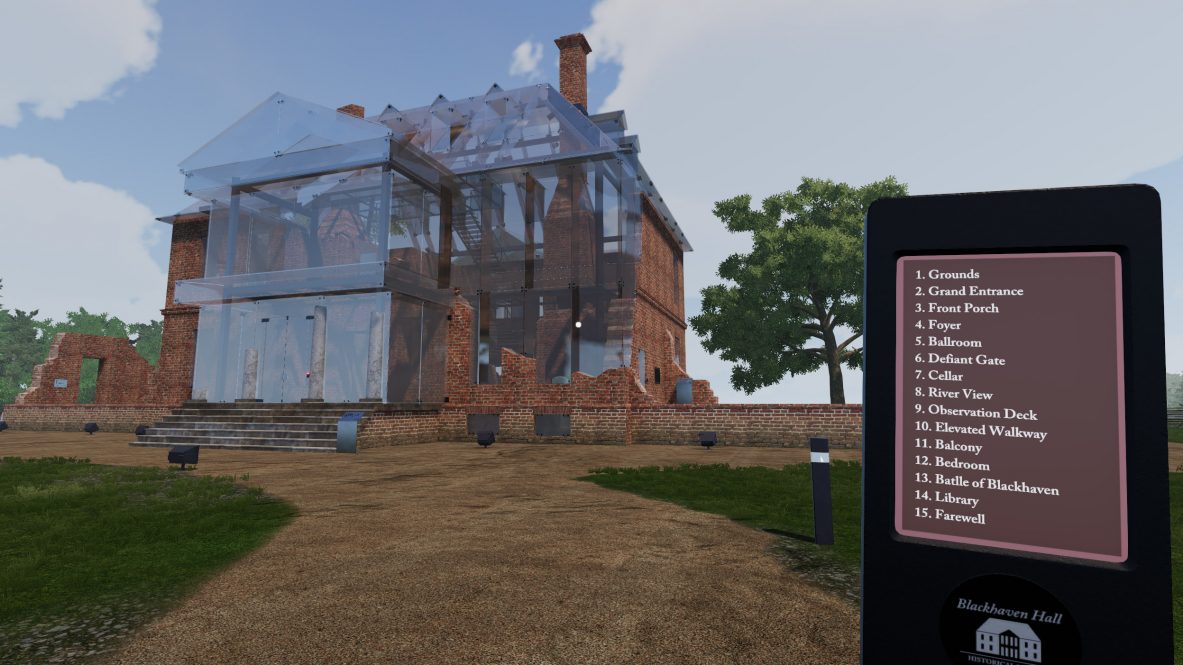The lingering mysteries of America’s Colonial past are the subject of “Blackhaven,” a historically-themed video game being released in late July on the online gaming platform Steam by a new professor in the Digital Media & Design (DMD) department.
James Coltrain joined DMD as an assistant professor of Game Art and 3D Modeling last fall and with his studio, Historiated Games, uses documents, images, and artifacts to develop historically accurate narrative titles.
 “Blackhaven,” is Historiated’s first game, in which players take the role of Kendra Turner, a sophomore at a historically Black college who is an intern at the Blackhaven Hall Historical Society, the site of the ruined 18th century estate of Thomas Harwood, a fictional American Founding Father. As Kendra follows her curiosity through the museum’s exhibits and archives, she finds cracks in Blackhaven’s official story and uncovers a trail of secrets and misdeeds that spans centuries and may determine her future.
“Blackhaven,” is Historiated’s first game, in which players take the role of Kendra Turner, a sophomore at a historically Black college who is an intern at the Blackhaven Hall Historical Society, the site of the ruined 18th century estate of Thomas Harwood, a fictional American Founding Father. As Kendra follows her curiosity through the museum’s exhibits and archives, she finds cracks in Blackhaven’s official story and uncovers a trail of secrets and misdeeds that spans centuries and may determine her future.
“Blackhaven” also as serves as a preview for a larger game called “Cassius,” a first-person exploration game where players will get to experience Blackhaven Hall in 1781, when it had been evacuated at the height of the American Revolution. “Cassius” is targeted for a 2022 release.
Although Coltrain is unique in handling the research, art, and programming of “Blackhaven” on his own, the final product reflects the contributions of a team of scholars, students, and advisers. To make sure the main character Kendra reflected the experience of an HBCU student confronting an unwelcoming historical space, Coltrain partnered with faculty at Xavier University of Louisiana, working with a group of students under the direction of Shearon Roberts, professor of Mass Communication, to craft Kendra’s personality and the game’s dialogue over long Skype sessions. The lead voice role of Kendra is played by actress Darby Farr, a former HBCU student.
While games to teach history have existed as far back as classics like “Oregon Trail,” Coltrain says he does not want “Blackhaven” to be just a stale piece of edutainment.
“I want it to stand on its own as a piece of narrative entertainment, but I also want it to be something that illuminates some themes about history and also is as faithful as possible… a game that you want to play,” he says. “I’m going towards a high degree of historical accuracy, but total historical accuracy is just not always going to be possible. A movie will sometimes compress three or four people into a composite character. That’s not something that a historian would do, but a historian certainly is going to generalize and synthesize. I try never to have anything represented that I know for sure would have been impossible or anachronistic.”

Speaking at the UConn Human Rights Film+ Series last spring, Coltrain argued that because video games have become “a cultural juggernaut,” historians should not ignore new media and technologies.
“One commentator recently suggested, I think persuasively, that based on sales and playtime, the Call of Duty game franchise is the most influential interpretation of World War II in the last two decades,” Coltrain says. “Yet games offer not only the possibility for more accurate representations of the past, but also historical experiences of place, embodiment, and participation that almost no other art form can provide. I hope that Blackhaven serves not only as a kind of history, but it’s also able to give players a tiny taste of what it might feel like to sit with Kendra working late into the night, digging deep into the archives to make a history of her own.”
Heather Elliott-Famularo, head of DMD, says collaborations with humanities faculty and digital media and design faculty are increasing as colleagues seek new ways to communicate their research.
“There are like-minded researchers who are excited about collaborating at UConn, particularly around human rights and history,” she says. “In fact, we are in the midst of developing a new minor in Digital Public History, via a NEH grant. We’re reexamining how we visualize and teach history through digital media, and our department can act as the catalyst to allow these kinds of innovative collaborations to happen. And most importantly, we’re training students to address meaningful topics and have literacies in these new areas.”
“Blackhaven” will release on Steam on July 27. Visit the game’s page at Steam, or learn more about Coltrain’s work at Historiated Games.



